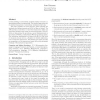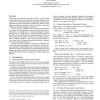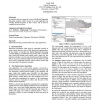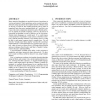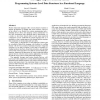118
click to vote
HASKELL
2006
ACM
15 years 8 months ago
2006
ACM
Some type class instances can be automatically derived from the structure of types. As a result, the Haskell language includes the “deriving” mechanism to automatic generates ...
121
click to vote
HASKELL
2006
ACM
15 years 8 months ago
2006
ACM
Correct handling of concurrently accessed external resources is a demanding problem in programming. The standard approaches rely on database transactions or concurrency mechanisms...
132
click to vote
HASKELL
2006
ACM
15 years 8 months ago
2006
ACM
Haskell’s type system with multi-parameter constructor classes and functional dependencies allows static (compile-time) computations to be expressed by logic programming on the ...
108
click to vote
HASKELL
2006
ACM
15 years 8 months ago
2006
ACM
In this paper we address the lack of extensibility of the exception type in Haskell. We propose a lightweight solution involving the use of existential types and the Typeable clas...
110
click to vote
HASKELL
2006
ACM
15 years 8 months ago
2006
ACM
In this article we present GenI, a chart based surface realisation tool implemented in Haskell. GenI takes as input a set of first order terms (the input semantics) and a grammar...
116
click to vote
HASKELL
2006
ACM
15 years 8 months ago
2006
ACM
In languages that support polymorphic variants, a single variant value can be passed to many contexts that accept different sets of constructors. Polymorphic variants are potenti...
127
click to vote
HASKELL
2006
ACM
15 years 8 months ago
2006
ACM
We introduce the new, improved version of the Haskell Equational Reasoning Assistant, which consists of an Ajax application for rewriting Haskell fragments in their context, and a...
168
click to vote
HASKELL
2006
ACM
15 years 8 months ago
2006
ACM
Many numerical algorithms are specified in terms of operations on vectors and matrices. Matrix operations can be executed extremely efficiently using specialized linear algebra k...
120
click to vote
HASKELL
2006
ACM
15 years 8 months ago
2006
ACM
Modern functional languages offer several attractive features to support development of reliable and secure software. However, in our efforts to use Haskell for systems programmin...

